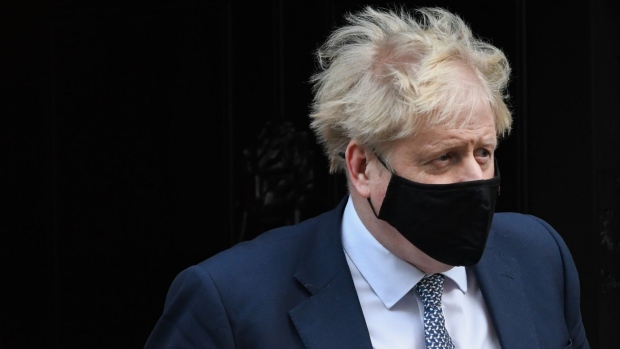Jan 18, 2022
Johnson Under Threat: How U.K. Tories Get Rid of Their Leaders
, Bloomberg News

(Bloomberg) --
Boris Johnson’s U.K. premiership hangs in the balance after he admitted attending a gathering with staff at Downing Street during the pandemic lockdown when such events were banned.
Read More: Johnson’s Ex-Aide Accuses Him of Lying to U.K. Parliament
Amid the fallout, Johnson’s ruling Conservatives have slumped in the polls and his party’s patience is wearing thin. Yet he is unlikely to resign over what the media has dubbed “partygate,” so what happens next may hinge on how many Tory members of Parliament decide they no longer want him in the top job.
Below is a guide to how the party deals with leaders it wants rid of.
Shaping History
The fate of Tory prime ministers is determined by rank-and-file Conservative MPs known as the 1922 Committee. It takes its name from a meeting of Tory lawmakers 100 years ago that ultimately brought down a coalition government and led to the Conservatives winning the ensuing election.
“The ‘22” has continued to play a key role in Tory history. While Margaret Thatcher’s demise in 1990 was prompted by her deputy premier quitting, it was her ministers’ advice that she wouldn’t survive a second 1922 committee ballot on her leadership that made her withdraw. Her reference to “men in gray suits” calling on her to stand aside is now often used describe the ‘22.
During her successor John Major’s tenure, the group embodied Tory opposition to closer ties with Europe. David Cameron -- who ultimately called the Brexit referendum -- wanted to dilute its influence by opening up its membership. He failed; Graham Brady was elected chairman and has has held the job since.
Eyes on Brady
Nowadays the ‘22 is primarily a line of communication between the party leadership and the rank-and-file. Reporters gather outside the committee’s weekly meetings to try to gauge the mood by the volume of desk-thumping.
When an unhappy Tory MP wants a change in party leadership, it’s Brady they write to. If letters arrive from 15% of Conservative lawmakers in the House of Commons, he is obliged to call a confidence vote. In Johnson’s case, the magic number would be 54.
Nobody except Brady knows how many letters have been submitted at any given time. Reports giving a running count “should be treated with extreme caution,” Brady told Bloomberg on Monday. “Only I would know and I have never breathed a word on the subject to anyone.”
Where Things Stand for Johnson
Still, some MPs do go public. As of Monday, seven Tory lawmakers had called on Johnson to resign, including party grandee Roger Gale and former minister Caroline Nokes. Many more told Bloomberg they will decide once a civil service report into “partygate” is published as early as this week.
If 54 letters do reach Brady, he would inform Johnson and the parliamentary Conservative party, and a vote on his leadership would be held as soon as possible. If Johnson wins, he is immune from another vote for a year.
That particular rule ultimately did not save Johnson’s predecessor, Theresa May. She won a Tory confidence vote in December 2018, but was out of Downing Street months later -- after a meeting with Brady -- as the Tory party threatened to tear itself apart over Brexit.
Leadership Contest
If Johnson were to lose a confidence vote, or if he resigns, the next step would be a leadership contest. In the first stage, Conservative MPs put themselves forward as candidates, and their colleagues vote in a series of rounds until two remain. Grassroots Tory members make the final choice.
There’s another way the Tories could arrive at a leadership contest: Johnson’s cabinet could effectively take matters into its own hands. If enough members resign, or perhaps one of the two biggest names, that would signal they have lost confidence. The pressure could then make Johnson’s position untenable.
Next in Line?
As Johnson battles the “partygate” fallout, much of the Westminster focus is on Chancellor of the Exchequer Rishi Sunak and Foreign Secretary Liz Truss. Both are expected to be frontrunners in any leadership contest.
But they also are widely seen as having the power to end Johnson’s premiership by resigning and directly challenging for the top job. What was perceived as their lukewarm response to Johnson’s apology in Parliament last week has done nothing to dampen speculation.
A Sunak-Truss battle would have its own intrigue. According to a poll run by the Tory-supporting website ConservativeHome, Truss regularly scores highly among the party’s rank-and-file membership, which would be a concern for Sunak if both make it to the final round of voting.
©2022 Bloomberg L.P.






